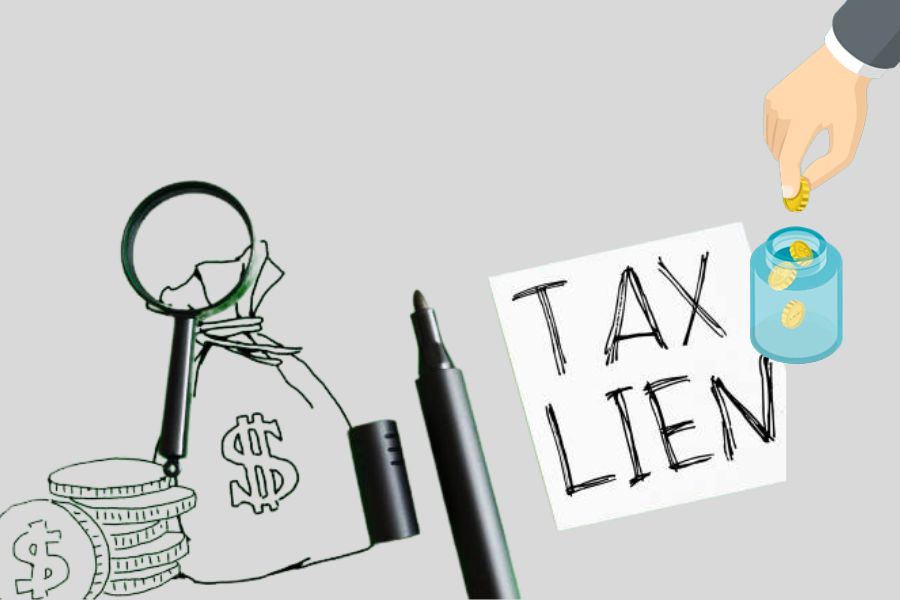What are tax lien investments? Tax lien investments involve purchasing tax liens on properties with delinquent property taxes. These investments are typically offered by the local governments i.e., counties as a means to collect overdue property taxes. Here’s how tax lien investments work:
- Property Taxes: Property owners are required to pay property taxes to their local government or taxing authority. These taxes fund various public services and infrastructure.
- Delinquent Taxes: When property owners fail to pay their property taxes, the local government may place a tax lien on the property. A tax lien is a legal claim against the property that gives the government a right to collect the overdue taxes.
- Tax Lien Certificate Auction: To recover the unpaid taxes, many local governments hold auctions where investors can purchase tax lien certificates. These certificates represent the amount of the delinquent taxes plus any penalties and interest that have accrued.
- Investor Bidding: Investors bid on the tax lien certificates, with the highest bidder winning the certificate. The interest rate or penalty rate offered in the bid can vary depending on the auction rules of the specific locality.
- Lien Redemption Period: After an investor wins a tax lien certificate, the property owner typically has a redemption period during which they can pay the overdue taxes, penalties, and interest. Under Florida law, you get at least two years after the tax lien sale to redeem the property before it’s sold at a tax deed sale. If the property owner redeems, the tax lien is released, and the investor is reimbursed their investment plus interest.
- Potential Profit: If the property owner does not redeem the tax lien certificate within the redemption period, the investor may have the right to foreclose on the property. This could lead to acquiring the property at a significantly discounted price. Additionally, if the property owner redeems the lien, the investor earns the interest specified in the certificate.
What advantages are offered by tax lien investments?
- Fixed Returns: Tax lien certificates often come with a fixed interest rate, providing a predictable return on investment.
- Secured Investment: The investment is secured by a claim on the property, which can provide some level of security.
- Potential Property Acquisition: Investors have the opportunity to acquire properties at a discount if the property owner fails to redeem the lien.
What are the risks?
- Legal Complexity: The process of acquiring properties through tax liens can be legally complex, and the rules vary from one jurisdiction to another.
- Property Conditions: Investors should assess the condition and value of the properties they may acquire through tax lien foreclosures.
- Redemption Risk: There is a risk that the property owner may redeem the lien, in which case the investor’s interest income is their only return.
- Research and Due Diligence: Thorough research and due diligence are essential to mitigate risks and select the right tax liens.
- Local Regulations: Be aware of the specific rules and regulations governing tax lien investments in the area where you plan to invest.
What is the process like in Florida? Investing in tax liens in Florida involves purchasing delinquent property tax liens as an investment. The process can vary slightly from Florida county to county, so it’s important to understand the specific procedures in the county where you intend to invest.
Here’s a general overview of how to invest in tax liens in Florida:
- Research and Preparation:
- Choose a County: Decide on the specific county in Florida where you want to invest in tax liens. Different counties have different rules and auction schedules, so research is essential.
- Research Tax Sales: Check the county’s official website or contact the tax collector’s office to find information about upcoming tax lien auctions. Some counties hold online auctions, while others may conduct them in person.
- Review Properties: Research the properties that have tax liens on them. You can often find a list of properties with tax liens before the auction. This list may include property details and the amount of the tax lien.
- Register for the Auction:
- You’ll typically need to register for the tax lien auction. This may involve paying a registration fee and providing necessary information, such as your contact details.
- Attend or Participate in the Auction:
- If the auction is in person, attend the auction at the designated location. If it’s an online auction, you’ll need to register on the auction platform and participate online.
- Bidding Process: When the auction begins, you can bid on the tax liens for properties that interest you. Bidding can be competitive, and it’s important to set a budget and stick to it.
- Winning Bids: If your bid wins, you’ll be awarded the tax lien certificate for that property.
- Payment:
- Once you’ve won the tax lien certificate, you’ll need to pay the winning bid amount. Payment methods and deadlines can vary by county.
- Ownership Rights and Redemption Period:
- After acquiring the tax lien certificate, you don’t immediately gain ownership of the property. Instead, you have a lien on the property. The property owner has a redemption period to pay off the delinquent taxes, plus interest, to redeem the property. As noted above, a property owner has 2 years to redeem in Florida.
- Profit and Risk:
- If the property owner redeems the tax lien, you’ll receive the invested amount plus interest, which can vary depending on the county’s rules.
- If the property owner doesn’t redeem the tax lien within the redemption period, you may have the option to foreclose on the property. The process for doing so can vary by county and can be legally complex.
- Due Diligence:
- Conduct thorough due diligence on the properties you’re interested in, as tax liens may come with risks. Make sure you understand the condition and value of the property, as well as any potential legal issues.
